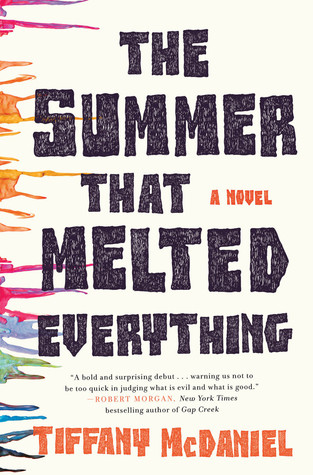 The Summer that Melted Everything by Tiffany McDaniel
The Summer that Melted Everything by Tiffany McDanielMy rating: 4 of 5 stars
Got this proof copy off Netgalley. This book sounds quirky, but it is anything but. With characters called Autopsy, Grand, Fielding and Dresden, you would think this was intended to be satire. But it isn't.
It's the summer of 1984 and young Fielding Bliss' prosecutor father publishes a letter in the Breathed local newspaper - a letter inviting the devil to town. When a young boy claiming to be the same arrives, the quiet life of the Breathanians changes forever. As the townspeople attempt to come to terms with the new arrival, the Bliss family must tackle their own demons. Over one long summer, Fielding's world is turned upside down. He will remember this summer as the one that melted everything.
This book mixes Southern realities with magic realism. It's a combination of many favourites that have come before, while being a whole new animal on its own. You will get the wistful sense of 'To Kill a Mockingbird', '100 Years of Solitude', 'Atonement', and especially last year's Booker shortlist 'The Fisherman'. The book was very reminiscent of the latter - what with the perspective of a young boy watching his family be torn apart from almost supernatural circumstances.
There is no doubt that Tiffany McDaniel is a phenomenal talent-in-waiting. There are turns of phrases and a poetic logic that permeates through every paragraph.
For example, here's a line from page 112:
Maybe she was like Samson, the long hair her strength, and I was Delilah, cutting it shorter and shorter with the wielding ax I put inside her.
In fact, the themes of each of her chapters often feel hindered by the addition of the 'Paradise Lost' epigraphs at the start of each chapter; I felt they took away from her own talents. She doesn't need that peg of familiarity - her prose should be allowed to stand on its own.
Despite being a proof copy, I came across only two typos - there were other instances which may be typos, but I put them down to the particular dialect of the townspeople.
At times I felt the writer (or editor) was trying too hard to tie the theme into the text. The running metaphor of heat boiling and melting things/emotions/people feels too forced for a lot of the time.
For example, this piece of dialogue on page 141, doesn't read like something anyone would say:
“He’s mighty boiled up ’bout somethin’. Might scald us all if you let him in.”It's too on the nose, desperately trying to weave in the main theme. It may have worked if it was part of reported speech; but as dialogue, it absolutely doesn't. There are several instances over the course of the book where the theme intrudes instead of progresses the story.
As I am not American, I felt, at first, a little lost as to the context of the story. I read a large part of the book thinking the Bliss family were black. It's not mentioned clearly whether the town of Breathed has people of colour in it. It worries me that the character of the 'devil' is made black. It is used ostensibly for narrative purposes, but not as significantly as one would imagine. Had there been more characters of colour, it would have bothered me less.
It's hard to pinpoint how to feel about this book. It is an overall melancholic read, sans humour or positivity. The story is told in flashback, which means the narrator's perspective is even more jaded. That, and the fact that the to-ing and fro-ing in time did cause some confusion when reading. It sometimes wasn't clear which era we were in.
The central conceit of Sal the devil sometimes feels underused. He inveigles himself into the Bliss family and they call him son - yet, the span of time (which is over a summer, but always unclear) seems to defy such affection. Everything begins and ends with the summer, which doesn't have that much of an impact when reading the life of the narrator.
The characters jump off the page in this book, and you wish to understand or get behind their motivations in one way or other. The Bliss family are painted vividly, each member coming alive through actions, feelings and beliefs. Even the other townspeople, including Elohim and Dresden read as rounded characters. Not everyone is good or bad, they all have shades of grey - we like some and loathe some, depending on the time and action.
All in all, this is a good read, but a far too melancholic one. McDaniel as an author is more an artist than a writer. You can feel the heat of the summer on every page, and really understand the characters. She has written a nuanced book, that leans heavily on the great novels of before, but stands on its own as well. I feel there are great things coming for this author.
View all my reviews
Comments